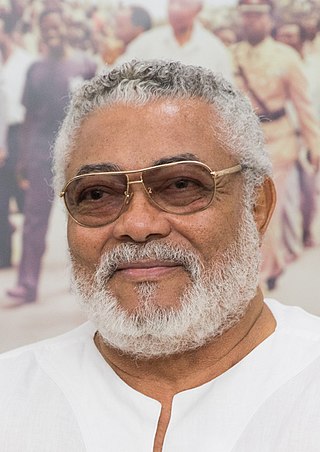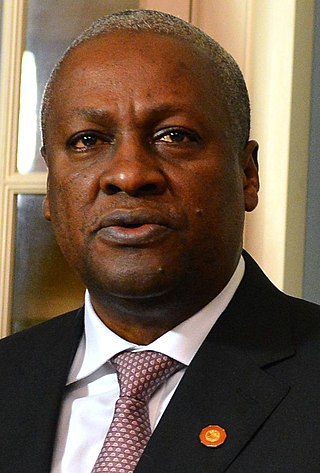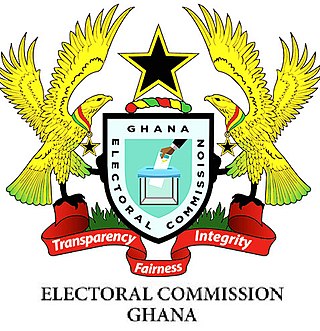
A think tank, or policy institute, is a research institute that performs research and advocacy concerning topics such as social policy, political strategy, economics, military, technology, and culture. Most think tanks are non-governmental organizations, but some are semi-autonomous agencies within government, and some are associated with particular political parties, businesses or the military. Think tanks are often funded by individual donations, with many also accepting government grants.

Politics of Ghana takes place in a framework of a presidential representative democratic republic, whereby the president of Ghana is both head of state and head of government, and of a two party system. The seat of government is at Golden Jubilee House. Executive power is exercised by the government. Legislative power is vested in both the government and Parliament. The judiciary is independent of the executive and the legislature.

The Government of Ghana was created as a parliamentary democracy, followed by alternating military and civilian governments in Ghana. In January 1993, military government gave way to the Fourth Republic after presidential and parliamentary elections in late 1992. The 1992 constitution divides powers among a president, parliament, cabinet, council of state, and an independent judiciary. The government is elected by universal suffrage.

John Kofi Agyekum Kufuor is a Ghanaian politician who served as the President of Ghana from 7 January 2001 to 7 January 2009. He became the Chairperson of the African Union from 2007 to 2008 and his victory over John Evans Atta Mills at the end of Jerry Rawlings' second term marked the first transition of power in Ghana from a democratic government to another democratic government.

Jerry John Rawlings was a Ghanaian military officer, aviator and politician who led the country for a brief period in 1979, and then from 1981 to 2001. He led a military junta until 1992, and then served two terms as the democratically elected president of Ghana.

John Evans Fiifi Atta Mills was a Ghanaian politician and legal scholar who served as President of Ghana from 2009 until his death in 2012. He was inaugurated on 7 January 2009, having defeated the governing party candidate Nana Akufo-Addo in the 2008 Ghanaian presidential election. He was previously the Vice-President from 1997 to 2001 under President Jerry Rawlings, and he contested unsuccessfully in the 2000 and 2004 presidential elections as the candidate of the National Democratic Congress (NDC). He was the first Ghanaian head of state to die in office.

John Dramani Mahama is a Ghanaian politician who served as President of Ghana from 24 July 2012 to 7 January 2017. He previously served as Vice President of Ghana from January 2009 to July 2012, and took office as president on 24 July 2012 following the death of his predecessor, John Evans Fiifi Attah Mills.

Nana Addo Dankwa Akufo-Addo is a Ghanaian politician who has served as the president of Ghana since 2017. He previously served as Attorney General from 2001 to 2003 and as Minister for Foreign Affairs from 2003 to 2007 under the Kufuor-led administration.
Joseph Henry Mensah was a Ghanaian politician and economist.

General elections were held in Ghana on 7 December 2008. Since no candidate received more than 50% of the votes, a run-off election was held on 28 December 2008 between the two candidates who received the most votes, Nana Akufo-Addo of the governing New Patriotic Party and John Atta Mills of the opposition National Democratic Congress. Mills was certified as the victor by a margin of less than one percent, winning the presidency on his third attempt. It is to date the closest election in Ghanaian history.

Jane Naana Opoku-Agyemang is a Ghanaian academic and politician who served as Minister for Education from February 2013 to January 2017. She is a full professor of literature. She served as the first female Vice-Chancellor of a state university in Ghana when she took over as Vice-Chancellor of University of Cape Coast. She currently serves as the Chancellor of the Women's University in Africa.

The Electoral Commission of Ghana (EC) is the official body in Ghana responsible for all public elections. Made up of seven members, its independence is guaranteed by the 1992 Ghana constitution. The current commission was established by the Electoral Commission Act (Act 451) of 1993. Kwadwo Afari-Gyan was the first substantive chairman of the commission, from 1993 to 2015. He was succeeded by Charlotte Osei as the first female chairman of the commission from 2015 to June 2018. Jean Adukwei Mensah succeeded Charlotte Osei in July 2018. On December 5, 2018, the Electoral commission chaired by Jean Adukwei Mensah reverted to the old logo showing the Coat of arms of Ghana and a ballot box showing the hand casting its votes, after the controversy over the new logo.

The mass media in Ghana, includes television, radio, internet publishing and newspapers.

The Constitution of Ghana is the supreme law of the Republic of Ghana. It was approved on 28 April 1992 through a national referendum after 92% support. It defines the fundamental political principles, establishing the structure, procedures, powers and duties of the government, structure of the judiciary and legislature, and spells out the fundamental rights and duties of citizens. It is made up of 26 chapters, not including the preamble.

Akua Sena Dansua is an experienced Ghanaian media and communications consultant, politician and governance and leadership practitioner. She was the Member of Parliament for North Dayi in Ghana and former Ambassador to Germany.

Henry Romulus Sawyerr, was a Ghanaian politician and surveyor. He was Minister for Education from 1993 to 1997 in Jerry Rawlings' first presidential term of office, under the Fourth Republic. In the Second Republic, Sawyerr was Member of Parliament (MP) for Osu-Klottey as a non-party candidate. In the Third Republic, he was again elected MP but gave up the seat to be in Hilla Limann's cabinet as Minister for Transport and Communications from 1979 to 1981.
The Coalition of Domestic Observers (CODEO) is a network of civil society groups, faith-based organizations, and professional bodies that observe Ghanaian elections to ensure free, fair, and transparent elections. Since its establishment in 2000, CODEO has become the largest domestic election observer network in Ghana–consisting of forty-two civil society, professional, and faith-based organizations. CODEO also holds membership with the Global Network of Domestic Election Monitors (GNDEM) and the West African Election Observers Network (WAEON). Despite the long history of both domestic and international election observers in Africa, CODEO has established itself as a continental example for successful election observation and peaceful transitions to democratization.
Jean Adukwei Mensa is a Ghanaian lawyer by profession who has been serving as chairperson of the Electoral Commission of Ghana since July 2018. She was nominated by the President, Nana Addo Dankwa Akuffo-Addo to take over the chairperson of the Electoral Commission (EC) from her predecessor, Charlotte Osei. Jean Mensa was born on November 12, 1971. Prior to assuming the role of chairperson of the EC, Jean Mensa spent an 18-year career at the Institute of Economic Affairs (IEA), rising to the position of executive director. As the EC chairperson, Jean Mensa declared the then presidential candidate Nana Addo Dankwa Akufo-Addo of the NPP as the president-elect of the December 7th, 2020 Presidential Election.

The presidency of John Atta Mills began on 7 January 2009 and ended on 24 July 2012. John Atta Mills, an NDC candidate, became the 3rd President of the Ghanaian Fourth Republic after he defeated NPP opponent Nana Akufo-Addo in the 2008 Ghanaian general election. After his death on 24 July 2012, John Atta Mills was succeeded by his vice president, John Mahama in accordance to the 1992 Constitution. He was the first Ghanaian Head of State to die in office.













